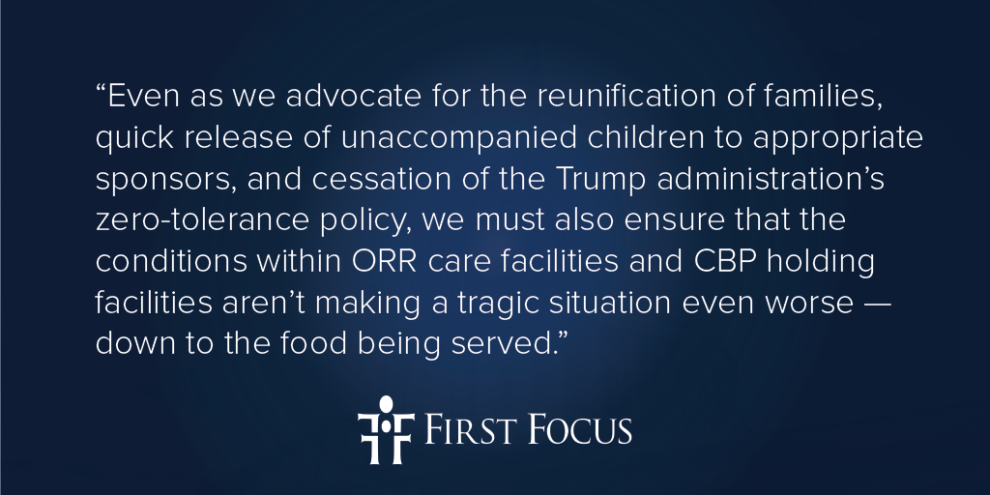
In the wake of the administration’s catastrophic and cruel zero tolerance policy at the southern border, advocates, policymakers and the public are demanding renewed oversight of Office of Refugee Resettlement (ORR) facilities caring for unaccompanied children, as well as investigations into the conditions that children face while still in Customs and Border Patrol (CBP) custody.
As well as ensuring the safety, health, and welfare of the thousands of children in ORR custody, it is vital to safeguard their access to adequate and appropriate food and nutrition.
Along with factors such as violence and persecution, extreme hunger and poverty are major “push factors” that prompt families and unaccompanied children to seek refuge in the United States. Data suggests that devastating drought across El Salvador, Guatemala and Honduras prompted unprecedented levels of food insecurity between 2014 and 2016, coinciding with a surge in unaccompanied children arriving to the US.
Malnutrition and food insecurity make it harder for children to develop, learn, and stay healthy. This is particularly concerning given that unaccompanied children also report mental trauma from violent conditions in their home countries, physical and sexual abuse during the trip to the U.S., as well as mental and physical stress from the journey, including dehydration. The separation of children from their parents is another form of trauma in and of itself. For children released into ORR custody, it is thus of utmost importance to have consistent, healthy meals.
The good news is that thanks to the 1997 Flores Settlement, we have national standards regarding the detention, release, and treatment of all children in immigration detention. These standards prioritize family reunification, requiring that children be released from custody into the care of a parent, legal guardian, adult relative or sponsor, or licensed child welfare program. However, if the government cannot release children, Flores states that they must keep them in the least restrictive setting appropriate to age and special needs in a non-secure facility licensed by a child welfare entity.
Because of these important protections, ORR requires care facilities to have state licenses, and they must meet ORR requirements to ensure a high level of quality care — including the provision of nutritional services in accordance with U.S. Department of Agriculture and U.S. Department of Health and Human Services nutritional guidelines and State licensing requirements. ORR care facilities also must establish procedures to accommodate dietary restrictions, food allergies, health issues, and religious or spiritual requirements, and incorporate cultural awareness into food menus.
Even with those requirements, however, the administration’s policy has prompted an influx of children, including infants and toddlers, into the care of ORR. This is cause for concern, with some arguing that ORR facilities are resource-strapped already, and not generally licensed for, or equipped to engage in, the care of these “tender-age” children. This extends to their nutritional needs, and experts, advocates and lawmakers are demanding more information about the health and nutritional care that the Department of Homeland Security and ORR are providing to very young children. For instance, the American Academy of Pediatrics recommends that infants under the age of 6 months be fed breastmilk exclusively, followed by continued breastfeeding as complementary foods are introduced. The Academy of Breastfeeding Medicine meanwhile argues that separating breastfeeding children from their mothers is a human rights violation, as the U.N. Human Rights Council says that infants in emergency settings, such as refugee camps, have the protected right to be breastfed.
The administration has provided little information on the conditions and care ongoing in tender-age children. Even worse, it is now petitioning to keep families with children in detention — a violation of Flores — and exempt facilities holding children from state licensing requirements. This is particularly disturbing amidst reports that the Department of Defense is scoping out sites to house even more children. Meanwhile, the process of family reunification is happening in fits and starts, with only half of the children under 5 set to be returned to their parents by a court-ordered July 10 deadline.
From coping with trauma to accessing legal counsel, the needs of children who arrived at the border unaccompanied and whom the Department of Homeland Security separated from their parents are varied and complex. Even as we advocate for the reunification of families, quick release of unaccompanied children to appropriate sponsors, and cessation of the Trump administration’s zero-tolerance policy, we must also ensure that the conditions within ORR care facilities and CBP holding facilities aren’t making a tragic situation even worse — down to the food being served.